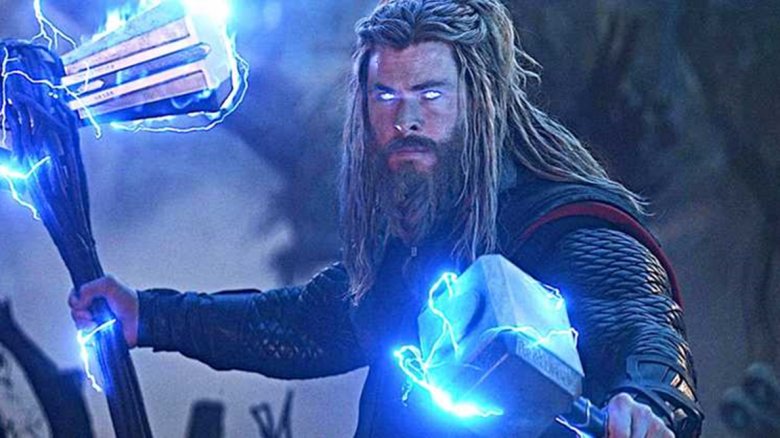How Thor's Ragnarok Transformation Changed The Entire MCU
The Marvel Cinematic Universe might look very different had the God of Thunder not been put through the wringer.
In a video essay posted by Vanity Fair, Avengers: Infinity War and Avengers: Endgame screenwriters Christopher Markus and Stephen McFeely explained that they had to change up the role that Thor would play in the two films, due to the radical reinvention the character underwent in director Taika Waititi's Thor: Ragnarok.
Fans of the MCU know very well that Waititi essentially rehabilitated the character of Thor, after his somewhat lackluster portrayal in the series prior to Ragnarok. While there were always humorous undertones to Odinson, Waititi tapped into star Chris Hemsworth's comedic chops to give us a Thor who was just as quippy as his fellow Avengers (perhaps due to having spent so much time with them), in contrast to his rather dour demeanor in Thor, The Avengers, Thor: The Dark World, and Avengers: Age of Ultron.
"Remember, we were inheriting a Thor from Ragnarok who was very well and radically re-toned from the previous Avengers movies," McFeely explained. "So, we had to fly in Hemsworth and Taika Waititi. Because word was getting out from Australia, 'You guys understand what we're doing with this movie?' [And] we're like, 'No, I don't know what you mean... Are you making him an idiot? I don't understand!'"
But Waititi didn't just tweak the Thunder God's characterization — he put the poor guy through the kind of narrative gauntlet that few Marvel characters have had to endure, forcing him to experience more significant loss in a single film than he ever had before. Markus and McFeely saw in this an opportunity to portray Thor in a novel, almost shocking way: in Avengers: Infinity War, the Thunder God is obviously still smarting from the events of Ragnarok, and in that film's opening, he's forced to witness the murders of his adopted brother Loki and his friend Heimdall at the hands of Thanos. During a later conversation with Rocket, Thor seems withdrawn, unsure of himself, insecure... in a word, depressed.
If this had not been so, perhaps Thor has the presence of mind to go for the head at the end of Infinity War — but instead, he makes a crucial error, failing to kill Thanos and allowing the Mad Titan to snap away half of all life in the universe. The failure nearly breaks the Thunder God, and when next we see him in Avengers: Endgame, he's despondent enough over it to kill a defenseless Thanos in the film's opening moments — an honor-free slaying that serves to push him even deeper into depression.
"In Thor: Ragnarok, he loses his kingdom, his father, his sister, and his eyeball," Markus said. "We just thought about what would happen if any one of us sustained this loss and horror. You would probably get incredibly depressed and retreat from the world. [Hemsworth's performance in Endgame] is a comedic performance with a lot of pain behind it."
If Waititi had not chosen to throw every hardship he could imagine at the Thunder God in Ragnarok, it's safe to say that Markus and McFeely's interpretation of the character would have been quite different. Instrumental as Thor's failure and subsequent breakdown are to the narrative of Infinity War and Endgame, it's even quite possible that "inheriting" a steadier, more confident Odinson might have had a significant ripple effect on the entire story that Markus and McFeely were crafting.
For that matter, the dour, kingly Thor of his first two solo films almost certainly wouldn't have made the choice he did at the conclusion of Endgame: to leave New Asgard in the hands of Valkyrie (Tessa Thompson) and depart to go on interstellar adventures with the Guardians of the Galaxy. This development seems likely to affect the MCU's overarching narrative for years to come; writer/director James Gunn's upcoming Guardians of the Galaxy Vol. 3 will certainly have to address it, and Thor's decision to leave the Earth behind is also certain to play into the story of 2021's Thor: Love and Thunder, which will see Thor's former flame Jane Foster picking up the hammer to become the Mighty Thor (and which will also be written and directed by Waititi).
Indeed, it's easy to make the case that with Thor: Ragnarok, Waititi didn't just reinvent the Thor franchise — he shook up the entire Marvel Cinematic Universe in ways that he probably never foresaw. It's funny that the MCU's most overtly comedic film would have the most overtly dramatic effect on the overarching narrative than any that came before it — and pretty amazing that Markus and McFeely were able to call an audible while constructing the most complex narrative the franchise has ever seen, and still put up the highest-grossing movie in history.
